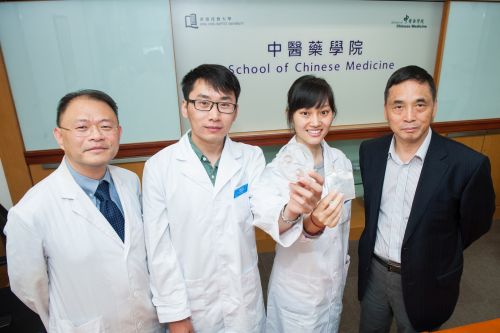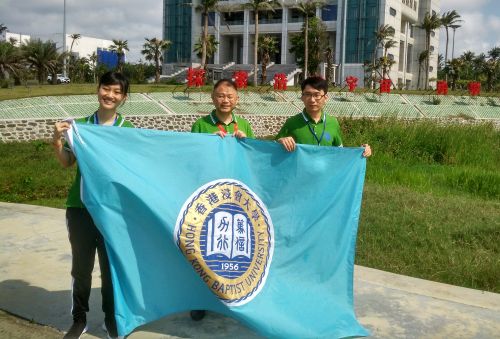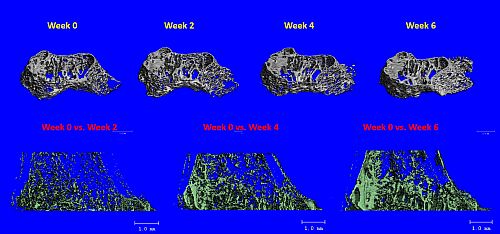|
| Thursday, 18 May 2017, 19:00 HKT/SGT | |
| |  | |
Source: HKBU | |
|
|
|
HONG KONG, May 18, 2017 - (ACN Newswire) - The School of Chinese Medicine (SCM) of Hong Kong Baptist University (HKBU) is conducting a space life science study aboard China's first cargo spacecraft, Tianzhou-1, which was launched last month. HKBU is the only institution of higher education outside the Mainland to conduct scientific research aboard the Tianzhou 1.
 | | The HKBU research team: (From left) Professor Zhang Ge, Dr Liang Chao, Miss Wang Luyao and Professor Lyu Aiping
(Copyright: Hong Kong Baptist University) |
 | | (From left) Miss Wang Luyao, Professor Zhang Ge and Dr Liang Chao witness the launch of Tianzhou-1 at the Wenchang Space Launch Centre in Hainan.
(Copyright: Hong Kong Baptist University) |
 | | In vivo osteoblast-specific delivery of CKIP-1 siRNA could improve bone formation and increase bone mass of aged rats dramatically. (Copyright: Hong Kong Baptist University) |
The HKBU team is studying effects of the CKIP-1 gene on bone formation in the microgravity condition on board the Tianzhou 1 in space. In microgravity, bone loss occurs several times faster than on Earth, posing a serious health threat to astronauts, who therefore cannot stay in space for long periods of time. The HKBU team hopes that the study will lead to the formulation of a set of protective measures and treatments as well as the discovery of new drugs to prevent or treat bone loss resulting from space travel. It could also serve as reference for the development of a health care and therapeutics for an ageing population.
The HKBU team is led by Professor Lyu Aiping, HKBU Dean of Chinese Medicine, and Director of the Law Sau Fai Institute for Advancing Translational Medicine in Bone & Joint Diseases (TMBJ), and Professor Zhang Ge, Associate Director of TMBJ, Associate Director of SCM's Teaching and Research Division, and Director of the Technology Development Division, with Post-doctoral Research Fellow Dr Liang Chao and Senior Research Assistant Miss Wang Luyao as team members.
Professor Lyu Aiping said this is another important contribution made by HKBU to the Mainland's major scientific research initiatives after its participation in the first deep-sea expedition aboard the manned submersible Jiaolong in 2013. This new contribution not only recognises HKBU's and Hong Kong's research strength in related areas, but is also a great source of encouragement to members of the Chinese medicine and higher education sectors.
Professor Zhang Ge says the quality of Bone & Joint Research at TMBJ has reached the top international level. TMBJ members have in recent years published a number of research papers in prestigious academic journals such as Nature Communications and Nature Medicine. He hopes their project will bring a breakthrough in this related area of research.
The CKIP-1 gene in osteoblasts (bone-forming cells) could specifically interact with SMURF1 genes in the cells to inhibit cell activity, thereby slowing down or hindering bone formation. The research team led by Professor Lyu and Professor Zhang further found that the aberrant elevated CKIP-1 expression in osteoblast could inhibit bone formation and contribute to the reduction in bone formation during ageing as well as in the development of glucocorticoid-induced osteoporosis.
Nevertheless, the function of CKIP-1 in the process of bone formation reduction caused by microgravity in space is still not yet known. The team has placed osteoblast in which CKIP-1 genes were silenced on board the Tianzhou 1 for further research, and is monitoring the effects of CKIP-1 on osteoblast.
To prepare for the launch of Tianzhou 1, Dr Liang Chao and Miss Wang Luyao of the HKBU team participated in a number of life science experiments at ground level, organised by the National Space Science and Application Centre of the Chinese Academy of Sciences. These experiments included simulated vibration tests, bio-compatibility tests and simulated microgravity experiments as well as systematic matching experiments and rehearsals. Tianzhou 1 was launched at the Wenchang Space Launch Centre in Hainan.
Entitled "Research on the impact of microgravity on the proliferation and differentiation of cells", the space life science study on Tianzhou 1 is led by Northwestern Polytechnical University in collaboration with HKBU, Tsinghua University, Zhejiang University, the Academy of Military Medical Sciences, and the Institute of Zoology of the Chinese Academy of Sciences. The project consists of eight sub-projects of which HKBU is responsible for sub-project CKIP 1.
Media enquiries:
Connie Ko of the School of Chinese Medicine (+852 3411 2132) or
M S Fung of the Communication and Public Relations Office (+852 3411 5261 or +852 7472 2122).
Topic: Research and development
Source: HKBU
Sectors: Materials & Nanotech, Travel & Tourism, Daily News, BioTech, Healthcare & Pharm, Engineering, Digitalization
http://www.acnnewswire.com
From the Asia Corporate News Network
Copyright © 2025 ACN Newswire. All rights reserved. A division of Asia Corporate News Network.
|
|
|

|
|
|
|